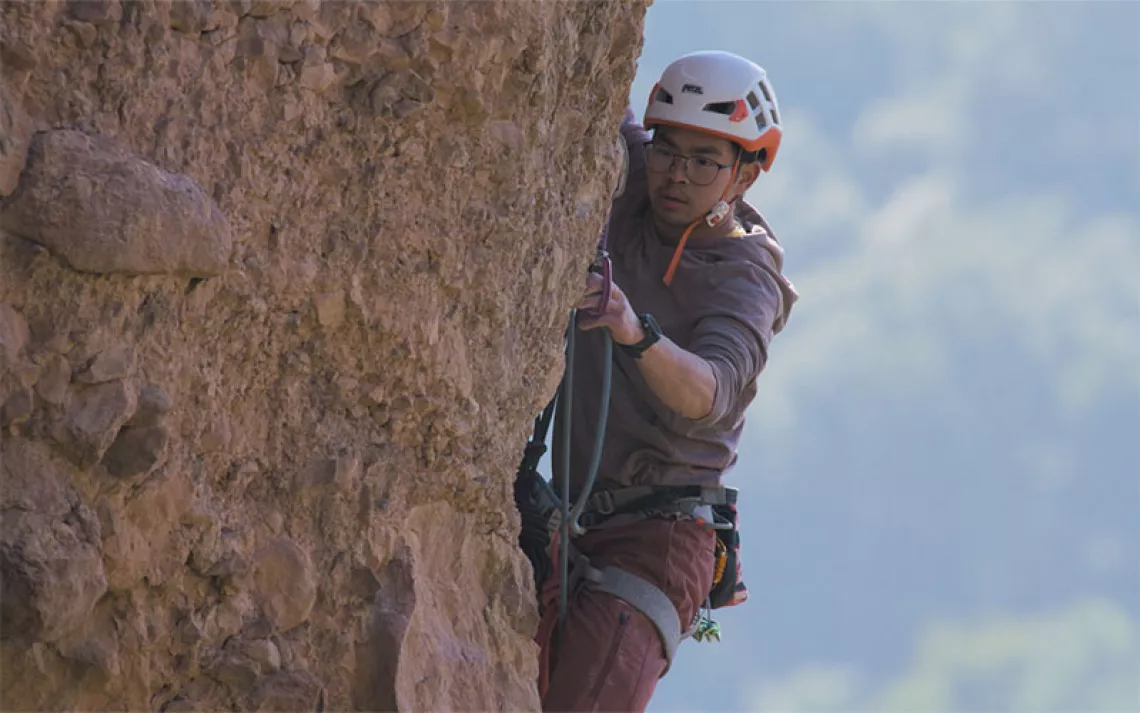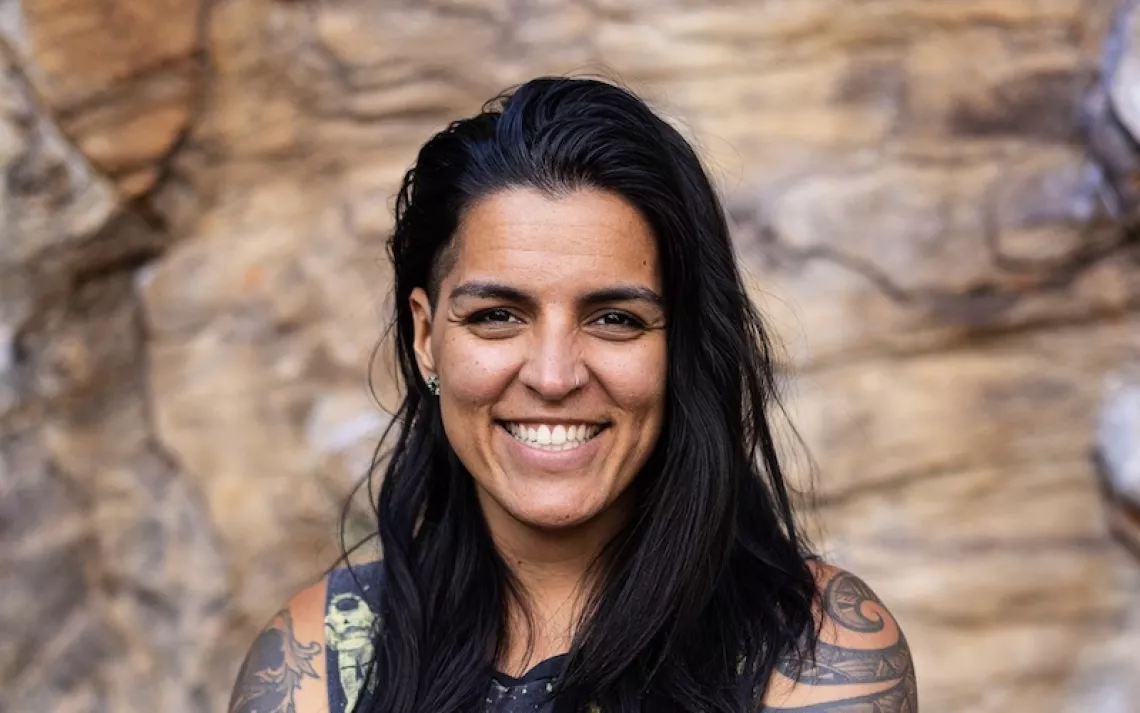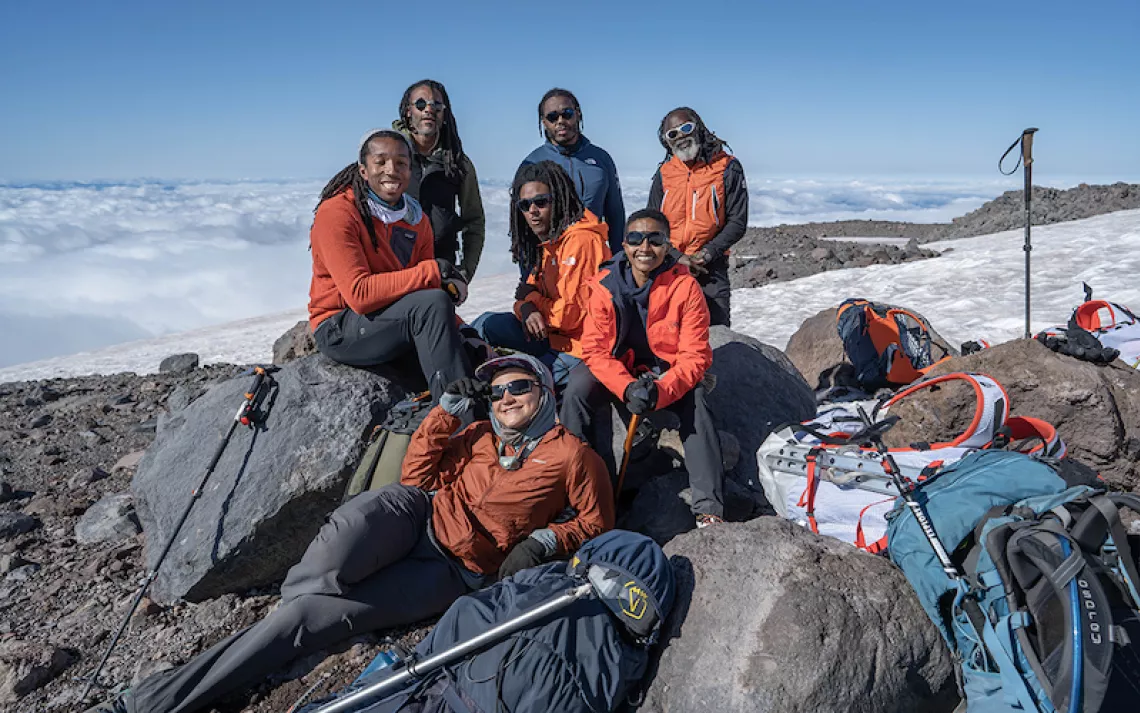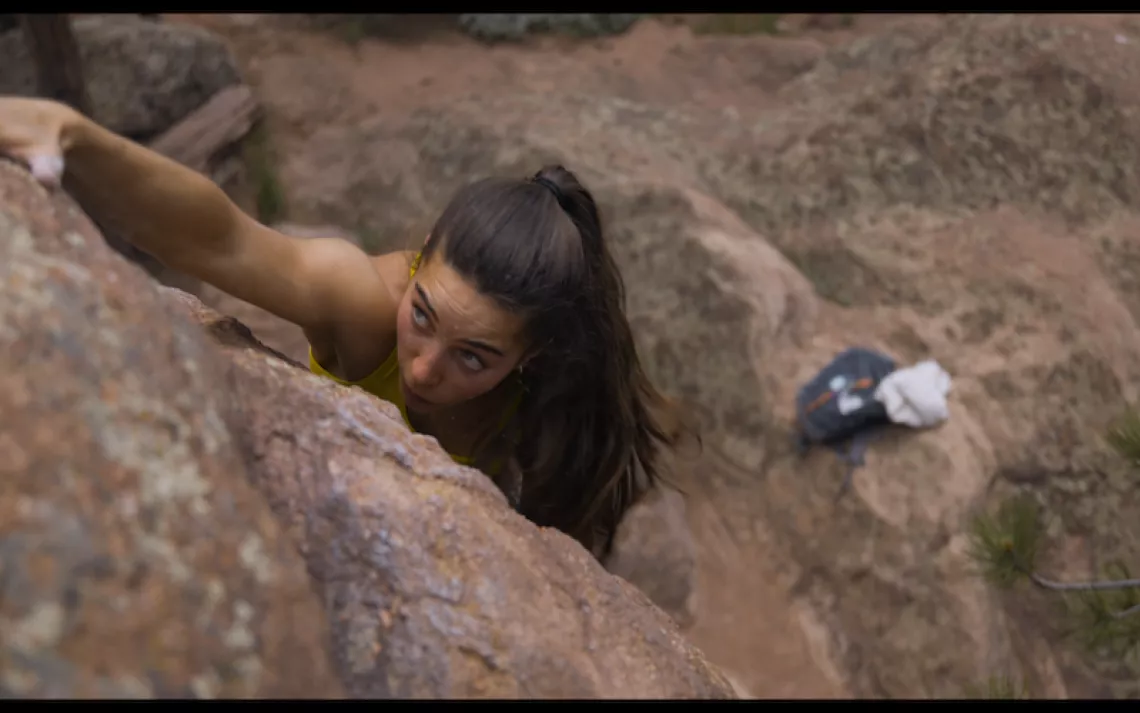Alex Honnold Is Interested in Much More than Simply Rock Climbing
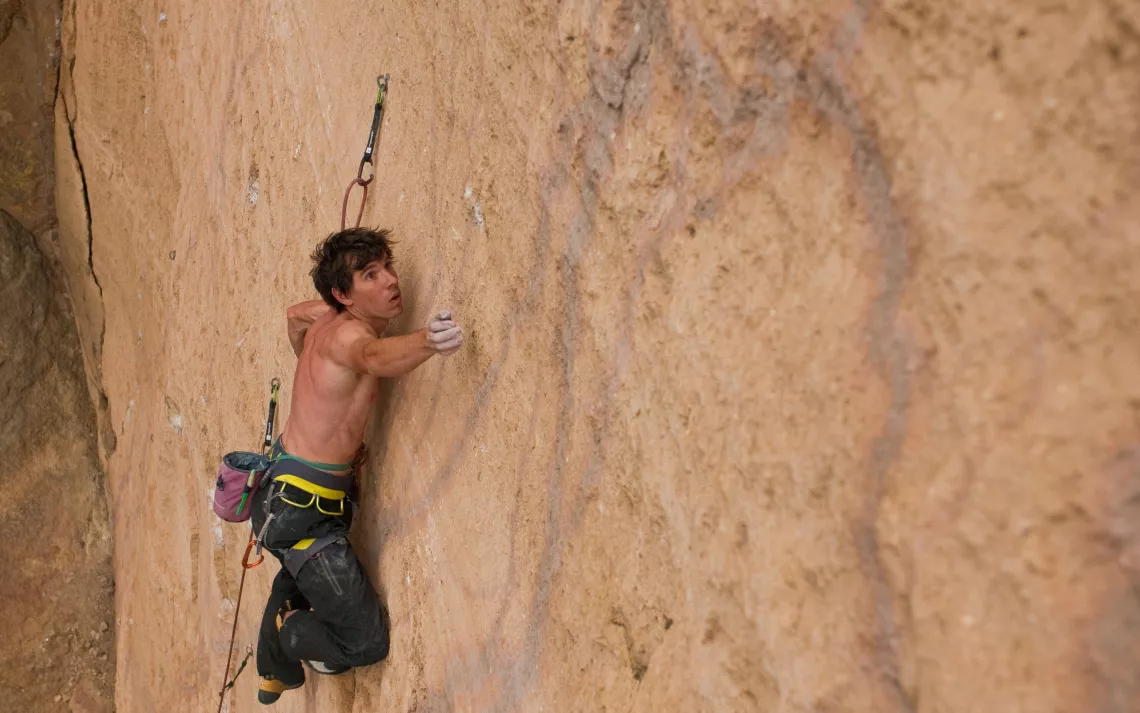
Photo courtesy of the Honnold Collection
Go ahead: Ask Alex Honnold yet another question about his unprecedented solo ascents and watch how he flips the toggle switch to autopilot. Sure, he’ll effortlessly rhapsodize about climbing—how he loves scaling rock walls and his many daredevil adventures. But he's painfully aware of how the topic usually descends into a predictable conversation about his dances with death. In a November interview on the main stage of the Banff Mountain Film and Book Festival, Honnold’s interlocutor started down that path until Honnold yanked the dialogue in a different direction.
“Let’s focus on life,” Honnold crooned pleadingly to the interviewer.
The truth is, Honnold is besotted with the idea of life—both living it fully and improving living conditions for others less fortunate than he. Honnold is using the newly chartered and self-funded Honnold Foundation to assist needy communities in the United States and Africa. Rather than act as a conduit to fund other environmental nonprofits, as he has in the past, Honnold is donating a third of his income to the foundation. In September, for example, he supplied villagers in the Republic of Angola with off-the-grid electricity. The effort represented a kind of climbing diplomacy, as Honnold worked in concert with Angolan government officials to set up a solar project near a site popular with rock climbers.
Honnold’s spirit of entrepreneurial philanthropy comes through in his new memoir, Alone on the Wall. Make no mistake: It’s not a classical specimen of that genre. A cynic might wonder about the grist quotient of a memoir written by someone who's just cleared his 20s, but Honnold's got stories aplenty to justify the volume. Many of us have witnessed his adventures, thanks to the ubiquity of cameramen who record his climbs, but we’ve rarely had the chance to hear his thoughts about his rope-less ascents.
What comes across with crystal clarity (despite the dudish climbing argot Honnold employs) is the guy's savvy and smarts, which was the first thing David Roberts, Alone on the Wall’s co-author, told me when I asked him months ago about his collaboration with Honnold. The armchair mountaineer will recognize the influence of Roberts, who practically invented the psychological mountaineering tome. Roberts serves as an ideal counterweight to Honnold's faux callowness, playing, at times, the wise elder and hovering conscience. Even with Roberts' capable intervention, Honnold isn't given to weighty introspection or second-guessing decisions made in the distant past. Still, he’s possessed of enough self-awareness to reflect on an epiphany or three, and at least one of those informed his environmental activism. We should be happy for those epiphanies, because Honnold, bless his bomber finger locks, isn't about to sit back and watch Earth fall apart.
“I’m deeply worried about the future of the world in the face of climate change, the unbridled use of fossil fuels, and so on,” he writes. “It’s this passion, as much as anything, that led to the idea of the Honnold Foundation.”
If Honnold’s environmental cri de coeur spurs just 10 percent of his 200,000 Facebook followers to pony up $10 to help heal the only world we’ve got, I say give him a long rope and let him run it out. Saving the planet is surely too big a wall for anyone to climb alone.
Talk about writing Alone on the Wall.
Earlier this year I was having a bit of an existential crisis. I took time off in the spring. It's kind of weird, turning 30, publishing a book about how rad I used to be, and not having any real prospects—no plans, no projects. I’m getting old. I’ve got a book coming out about things I used to do, and I have nothing else coming up. And I was like, “Ah, I’m so depressed.” But now I’m past that. I just took two months off and chilled, and now I’m all psyched again, projecting and stuff.
Writing a memoir has been compared to psychotherapy.
It didn’t feel quite as intensely personal like that. And with David co-writing the book, I didn’t have to dive in as deeply as others probably do in their memoirs. It’s more about what motivates me and that kind of thing. And I’m only 30. This isn’t a comprehensive overview of my whole life and my whole experience as a person. It's more like a "Best of" sampling of some of my better climbs.
In the book, you talk about The North Face climbing trip to Chad's Ennedi Region. You write about how, maybe for the first time, you realized how privileged you are. You called that dawning an epiphany. Did you perceive anything about the way [people there] live that might trump what we consider to be "privileged?"
I’ve actually always been totally opposed to the glamorization of poverty. People say, "It’s such a simple life; it’s such a beautiful way that they live." I’m like, "No. It’s horrible." There’s no access to healthcare. There’s no access to [electric] power. Nobody can read. One of the things that struck me in Chad was the fact that the people growing up in the Ennedi Desert where we were climbing, will literally never walk on anything but sand or rock. There’s no flooring. They’re literally walking on sand their whole life. There are goat heads everywhere. The grass is really prickly. (Actually the sandals I’m wearing right now still have goat heads in the bottom from Chad.) There are these crazy thorns in everything. To spend your entire life without ever walking on a flat, smooth surface, it kind of sucks. I think it's tempting for people in the First World to say that it’s so much better when you’ve lived a simple life. And I'm like, "No, dude, it’s horrible." You know what I mean? Right now I’m in a well-lit restaurant with my family and friends eating a nice meal. We’re drinking potable water. Super nice food seasoned with all kinds of things that are not local. I’m stoked that I’m not in a freaking hut, sitting in the sand right now in the dark.
You assumed that your carbon footprint was a lot smaller than the average American's because you were living out of a van. You discovered it wasn’t.
Yeah, it’s the amount of travel I do.
Some people try to neutralize their travel footprint by buying carbon credits. You didn’t think that that was enough. Why not?
Well, as I researched carbon credits, I realized that it was a very nebulous, gray area that wasn’t the cure-all that I hoped for. It wasn’t clear that it really helped. If somebody’s choice is between buying carbon credits and doing nothing at all, then it’s probably better to do carbon credits than nothing. Because it might not be perfect, but it probably is doing some good. But I was looking for a way to do more quantifiable good, to have a better sense of what exactly it was that I was doing. With carbon credits it’s unclear what your money is supporting oftentimes. And I think the best carbon credit schemes are when you’re supporting specific projects that improve people’s quality of life, which is ultimately what I’m trying to do through the Honnold Foundation. There are definitely carbon credit schemes that do that kind of thing. But when you have to vet them all, really research them, you may as well be supporting those organizations directly rather than through a carbon credit company.
I felt like I could do the same thing through the Honnold Foundation, because my original thought was that I would be [contributing] to both the Honnold Foundation and buying carbon credits. Then I realized that the carbon offsets would be supporting the same things that I want for my foundation. So I might as well put the money there.
With respect to minimizing impact while maintaining your quality of life, you write: "Who’s to judge an acceptable life? I don’t even know what I truly require to be happy." Maybe the accumulation of too much stuff is a leading indicator of unhappiness?
I think there’s a ton of evidence for that in the U.S. But the accumulation of things does improve people’s happiness up to a certain point. Because, like I was saying, access to water and power and having all those kinds of basic things are awesome and makes everybody happier, but only up to a point. Then there's a diminishing return.
It's called overshoot.
Totally. Everybody has to sort of know where their line is and what is really going to make them happier. I think that’s one of those weird things about suburban America, particularly. People have wildly overshot, but they don’t really realize it. There’s a ton of evidence that spending your money on experiential things will bring you much more happiness than on physical things, which seems super obvious to me, since all I spend money on is experiential. All I really do is have adventures, and obviously I’m very happy doing it. But I think that some people aren’t really aware of that, and they’re like, "Oh, I’ll buy a boat." Spending that money on fun boating-related activities will make you far happier than having a boat in your driveway.
There’s a concept called the global footprint—the number of Earths we are currently using—and I think we’ve already exceeded our planet's environmental services.
Well, people in the U.S. have. People in Europe, less so. And then even that, though, has a lot to do with how wisely you use your resources. I’m a firm believer that you can maintain the current quality of life and at the same time cause less impact.
What makes you so optimistic?
I think the negativity is misguided. I think the trends of human history are all in a positive direction, toward greater wealth and the sense that we have access to more opportunity, and safer, cleaner, healthier, longer lifespans. Better education. Those things have been steadily improving forever. But then also within society, there’s a huge trend toward liberal, equal opportunity, equal rights, gender opportunity. Basically all issues are slowly getting more liberal or more socialized, which I’m all for. Like access to universal health care, universal education, all those kinds of things. I think those are all very positive trends.

Cedar Wright and Alex Honnold install solar panels. | Photo courtesy of the Honnold Foundation
You talk in your book about wanting to support various environmental principles. What are those environmental principles?
"Environmental principles" might be a little overstated. I mean the basic Leave No Trace types of principles. Do no harm. Whatever you want to call it. Not to negatively impact the places where you’re having experiences. That’s the only principle, I would say.
Say more about the Angola trip.
I’ve been funding the Honnold Foundation with my own money for the most part, with some online donations. But it’s mostly my own. It’s never going to have the budget of a big nonprofit. So we look for niche solutions. What can we do and where can we have the biggest impact? So we started looking at new markets. There's currently no solar at all in Angola. So we figured we could crack open the market, and as a demonstration project show that solar energy is possible. We found an Angolan partner, a for-profit that does that kind of work, and we donated the money for the [solar lighting] systems. We bought 100 solar systems that they would then set up in their standard branded kiosk, which is the model they use in East Africa. We were going to provide the seed money for them to set up a little shop. From the perspective of the Honnold Foundation, it’s cool, because either way we’re donating the same amount of money and the same amount of systems are getting put in on the ground. But in Angola, where no one's been, we’re proving the potential of the market.
Long story short, we wound up being taken in by an influential businessman who owns a five-star resort that has the best piece of rock in Angola on it. So we went there to climb on his rock, and he had a bunch of local news there to cover us, because he was trying to promote his lodge. Anyway, he became interested in the whole solar project and introduced us to the Minister of Energy, who then ordered 3,000 more systems for a bigger demonstration project. We’ll see how much of it happens, but just the fact that we had a meeting with the Minister of Energy was pretty rad. I think the project was like $30,000 which is significant, but it’s nothing compared to what it will be to deploy solar all across rural Africa. But it’s cool to use that $30,000 in a way that then gets the attention of the Minister of Energy, who then potentially orders several hundred thousands of dollars-worth of product.
How did Angola come to your attention?
It was a confluence of things. Stacy Bare, who works for the Sierra Club, had lived there doing landmine removal. So he wanted to go back when it’s not landmined, as a peacetime project. Then this Belgian filmmaker had been talking to me for a long time on doing a film in Africa, and he wanted to go to Angola because there’s a ton of rock there. Random things like that.
So you picked a locale where your money could go farther because of the lack of existing infrastructure. You found leverage in that lack.
Yeah, exactly, and because of the higher risk, and because it’s undeveloped. Undeveloped, meaning nobody has tried solar there. We're talking about using the same strategy in Ethiopia next year, because Ethiopia is projected to have one of the highest populations in Africa by 2100, and it’s also one of the least electrified countries. So it’s totally prime for off-grid solar. Also, the climbing in Ethiopia is totally awesome and relatively well-developed. So it would be kind of an ideal place for a two-week climbing trip and a week of solar work. We'll see if we can do some fund-raising for it this year and push it a little harder.
You write about practicing sustainability in the same manner you approach climbing: by setting small, concrete goals that build on each other.
Part of the reason I said that was because a big part of my environmentalism stems from my sister, who is ultra-conscientious, vegan, never owned a car, and lives in Portland. She bought me this book called The Better World Shopping Guide, maybe ten years ago, and it's basically a little consumer guide that ranks brands for different categories. At the time it seemed kind of eye-opening. If I’m going to buy a loaf of bread, at an identical price point, except that one company is dumping toxins into the river and one company isn’t, I may as well support the other one. I was like, “Oh, wow, I should be more conscientious about this kind of stuff and make more effective choices.”
My sister gave it to me as a little gift, and she signed it, “For Alex, in case you ever start giving a shit.” I was like, “Aw, so cute.” So I got all into it and then I bought copies for my friends. And one of the things in The Better World Shopping Guide is a ranking at the beginning of the book, the most effective things that an individual can do. The first was to change your bank to a credit union, a nonprofit credit union, because wherever your money lives, that money is being used all the time for things that you may or may not support. So if you’re banking with freaking Bank of America, you’re supporting all kinds of heinous things, and tons of money [is] getting pumped into politics to support things that you, as an individual, would never support. So partially because of that book, I started working on those kinds of things. I changed my bank. I changed my diet a bit. I’ve been working my way through what I can as an individual.
Have you become a vegan?
No, I’m not vegan, but I’m trending that way. I'm 90-percent of the way there. The environmental side is a no-brainer, and in terms of human performance and optimal health, there’s a ton of evidence that it’s way better for you.
How should we be framing our approach to adventure and travel? Should we be looking for adventure closer to home? Have you developed any kind of an ethos with respect to travel?
No, not so much, actually. And that’s a big part of why I started the Honnold Foundation and why I’ve changed my diet and minimized other things, [because] I haven’t been willing to change the amount that I’m traveling. That’s my choice. Others might be more willing to give up travel and less willing to make dietary changes. I’ve sort of made easy choices, or made the choices that are easy for me.
You’re using lifestyle to opt out of a stuff-oriented system.
Yeah, it’s interesting. I’ve honestly never thought about that, but I think that is true. Using lifestyle to opt out of the whole system. And it’s funny, because it's been very satisfying to opt out of eating meat. I’m happy to not be supporting industries like that.
It’s been quite a wandering process. Like I said, I sort of started with the things that are easiest for me and then sort of worked my way up. I wish that more people would think about that and reflect on what’s easy for them, what’s worth changing. People should follow their own sustainability journey. The thing is, a lot of people aren’t even aware that there are problems that need to be solved. If you’re living in suburban America, it’s pretty easy to believe that life is great. Right there, you have to start with realizing that there is a problem and that plenty of people in the rest of the world are suffering, because of [our] lifestyle. Then go from [that realization] and try to do what you can to minimize harm.
A longer version of this interview, which was edited for clarity and length, appeared at Sustainable Play.
 The Magazine of The Sierra Club
The Magazine of The Sierra Club
